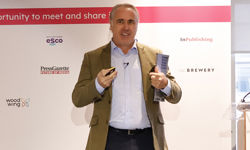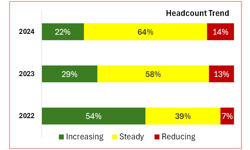The programme can be said to have matured and taken on a different character from previous years. There is a process, during the months of preparation, by which not only the major themes but also the atmospheres abroad in the industry are aired. This is because the people I talk to and correspond with are both influenced and influencing those atmospheres, and the programme takes on that feel by osmosis, as it were.
You can see this in the number of ‘where’s it all going?’ type debates and discussions scattered through the programme. The truth is that a great number of very clever people in the industry all have their own ideas about that, but no one knows for sure. What seemed like a revenue saver a couple of months ago now turns out to be a damp squib.
There is no doubt that the ‘digital space’, and particularly the world of apps, Apple and Android, are the hot topics. We get stuck into various aspects of this major theme with a number of different sessions – dealing with how to develop a strategy covering all the digital choices, what moves to make in the face of Apple’s intransigent insistence on creaming off not only a high percentage of subscription profits, but also hanging on to the data too, what new imperatives are facing design and typography, and a host of others. Case studies and from-the-coalface stories about how publishers are reshaping their businesses abound, because the Publishing Expo programme is nothing if not practical.
You will also find a stimulating stream of sessions dealing with the systemic changes that publishing companies are going through, willy nilly, by hook or by crook. New revenue models, new business models, new roles, new job titles; a new set of skills are required to define (for instance) the role of the editor – who now has to be a technologist and a search specialist as well as know when to use a semi-colon.
The ways in which the commercial side of the business is changing of course is also given due emphasis. Automated ad serving technologies, behavioural targeting, the changing ‘customer journey’, measuring return on your investment in social media; all these and more add up to a comprehensive array of presentations from the people at the outside edge of this volatile industry.
When it comes down to it, publishing has far more than its fair share of very clever people. It is those same people to whom I am grateful for contributing their time, energy and brain power to make the Publishing Expo seminar programme what it is. This year I’m delighted to welcome (in no particular order); Mark Wood, CEO of Future; Andrew Hirsch, CEO of the John Brown Group; Magicalia MD Duncan Tickell; creative giant Jeremy Leslie, ex of John Brown and now Magculture; digital consultant Dominic Jacquesson; Mike Soutar, MD of Shortlist Media; Ben Greenish, MD of The Spectator; James Tye, CEO of Dennis; the PPA’s chief executive Barry McIlheney; Tim Faircliff, AOP Chair & general manager of consumer media at Thomson Reuters; Neil Thackray of The Media Briefing; APA director Julia Hutchison; Kim Watson, MD of Millivres, publisher of Gay Times; Kurt Edwards, Future’s Digital Commercial Director; Chris Coward, chief operating director at Northcliffe Media in Wales and the southwest; Cameron Dunn, NatMag’s classified ad director; Nikolay Malyarov, all the way from Vancouver with NewspaperDirect; Rebekah Billingsley, BBC magazines’ publisher for mobile devices; Patrick Lenehan, Independent Digital Ireland’s chief technology officer; plus, of course, many many more. How can one not be proud of such a collection of fine minds?
Enjoy them. I know I will. See you there.










